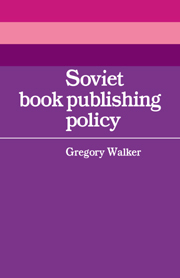Book contents
- Frontmatter
- Contents
- Acknowledgments
- Glossary of specialised terms
- Note on transliteration
- References to journals and series
- 1 Introduction
- 2 The political and economic view of Soviet publishing
- 3 The Communist Party
- 4 The government apparatus
- 5 The publishing-house
- 6 The author
- 7 Printing, paper and supplies
- 8 The book trade
- 9 Special kinds of publication
- 10 Conclusions
- Appendix 1 Authors' fee scales
- Appendix 2 All-union book retail prices
- Notes
- Select bibliography
- Index
- Frontmatter
- Contents
- Acknowledgments
- Glossary of specialised terms
- Note on transliteration
- References to journals and series
- 1 Introduction
- 2 The political and economic view of Soviet publishing
- 3 The Communist Party
- 4 The government apparatus
- 5 The publishing-house
- 6 The author
- 7 Printing, paper and supplies
- 8 The book trade
- 9 Special kinds of publication
- 10 Conclusions
- Appendix 1 Authors' fee scales
- Appendix 2 All-union book retail prices
- Notes
- Select bibliography
- Index
Summary
Publishing policies, in the USSR as elsewhere, are not necessarily either consistent or coherent. Issues rise to the surface for discussion and decision as a result of complex pressures and of circumstances which are by no means all open to observation. Subject to these unavoidable obstacles in the way of a precise or complete picture, conclusions from the evidence presented in this book are expressed here as the outcome of the intention declared in chapter 1: to show the effects of the interaction between the special characteristics of publishing and some distinctive features of Soviet society; and to illustrate their impact on the books which appear in the USSR.
Western descriptions of Soviet publishing policy have tended to emphasise the Soviet view of publishing as a tool of social and ideological influence; the unchallenging observance of directives from superior authority; and the subordination of economic considerations to political imperatives in the industry's management. The evidence presented in this book indicates that these matters of emphasis, while certainly elements in Soviet publishing policy, are misleading if over-stressed or taken in isolation.
Soviet publishing administrators work within an industrial system which is less open to radical manipulation than the accepted Western view suggests.
- Type
- Chapter
- Information
- Soviet Book Publishing Policy , pp. 122 - 126Publisher: Cambridge University PressPrint publication year: 1978

